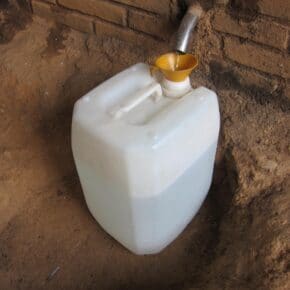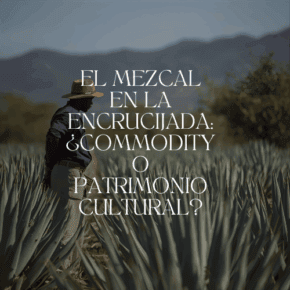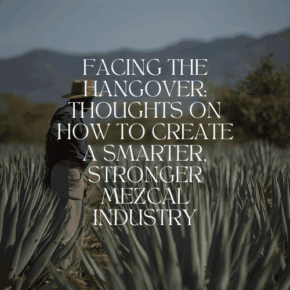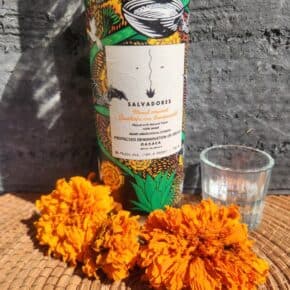The conversations among brand owners, producers, bar and restaurant folk are not new, but there is a renewed sense of importance behind them. Mezcal is part of a culture, but has also been commodified into an international luxury product. As the product of mezcal exponentially proliferates in foreign markets, there are clashing realities between the knowledge keepers of the land who know how to distill the essence of agave, and those who are looking for business opportunities. Since Oaxaca produces the vast majority of mezcal, many of the conversations are Oaxaca-centric. Sometimes discussions of Oaxacan mezcal serve as forecasting for other mezcal producing regions. While there is undeniable overlap, each region is unique and there is a lot happening in other states beyond the themes mentioned here.
Sustainability Beyond Maguey
A few years ago a brand that promised to plant three agaves for every one harvested was celebrated as sustainable, but in today’s market such a claim can actually be a red flag if not supported with other efforts. True sustainability goes far beyond having enough source material to produce more product, rather it focuses on the health of the communities that produce mezcal. It has to do with environmental issues like access to and preservation of clean water, deforestation of trees and other native plants in order to plant agave, acidification of natural bodies of water due to dumping byproducts of mezcal, to name a few. Socio economic factors are also part of any comprehensive sustainability effort. Where is the profit from mezcal going if not back into the hands of the communities that it is being extracted from? How can industry members and consumers verify best practices of brands, especially when they are not producer owned? The influx of tourism and outsiders, particularly in Oaxaca, also threatens cultural sustainability. At this moment these conversations are raising more questions than answers.
Centering Of Indigenous Voices
As the collective mezcal industry grapples with these questions it is increasingly clear that it is essential to center Indigenous voices for both questions and answers. People who are considered experts in mezcal are using their platforms to communicate the need to let the people of the land lead their own way when it comes to identifying the problems and potential solutions. There’s a chance to deepen our understanding of mezcal for those who are willing to listen. With an influx of white and green washing, it can be difficult to know which organizations are performative and which organizations are committed to Indigenous leadership. A good rule of thumb is whether or not an Indigenous person or group of people are in leadership positions, or simply being used as part of a marketing story. Another guideline is to listen to Indigenous people, rather than those who claim to help Indigenous people.
Producer Owned Brands
One of the simplest ways to address concerns of fair wages, cultural extraction and appropriation is to prioritize producer owned brands. Of course it is not as simple as saying all producer owned brands are good, or that any producer owned brand is better than all non-producer owned brands. While there are many notable exceptions across all mezcal producing regions, producers of great mezcal tend to have long standing heritage in their communities and understand the importance of taking care of the land. By cutting out a brand owning middleman, more profit and power is placed in the hands of the producer. In addition to maximum profits going back into the hands of those who understand mezcal production and advocate for a safe future for their land and communities, it also reduces the risk of altering traditional production practices at the request of a brand owner. (See list of brands in the U.S. market.)
Uncertified Agave Spirits
Also known as destilado de agave/agave distillates, agave spirits that for one reason or another are not officially certified as ‘Mezcal’ are becoming more prevalent. Some of these spirits fall outside of the current Mezcal Denomination of Origin, notably many of the spirits coming from Jalisco, and others choose not to participate in the certification program for financial, access, or political reasons. The controversial shift of power and leadership in the Consejo Regulador De Mezcal, or COMERCAM, plus the addition of new certifying entities makes the landscape of certification that much more difficult to navigate for producers and consumers. We are even seeing some brands changing course, choosing not to certify their products that they had been certifying in the past. What does this mean for the average consumer? Not much- whether agave spirits are certified or not they continue to be offered on shelves, backbars and flight menus as mezcal. As the rules around who can certify mezcal continue to fall into place we can expect more back and forth over what constitutes mezcal, culturally, historically, and legally.
Tequilafication of Mezcal
Unsurprisingly the telltale signs of turning Oaxaca and the broader mezcal category into a mega industry that resembles tequila are not only here, they are being celebrated in headlines across major media outlets. While large industrial brands are nothing new, a new level of selling the mezcal aesthetic has arrived. The fact that outlets like Vogue, Travel & Leisure, Michelin Guide, and Cool Hunting, are touting a hotel/resort in Oaxaca that costs $1,000 per night is a sign of big brands laying the groundwork for expansion. With access to funding from international conglomerates, every aspect of Oaxacan mezcal culture is up for sale. This is happening literally on top of and next to communities and ecosystems facing crises of sustainability, access, and security. As long as brands shell out the money for ‘journalists’ to visit, we will continue to see poorly investigated and misrepresented accounts of the ‘mystery’ and ‘luxury’ that consumers can buy and extract. El Silencio may have made a big splash, but there will be other brands with similar offers right around the corner. As the media continues to publish pay to play and puff pieces, the side of the industry focused on the health of the land and its people is raising its voice in opposition in a grassroots style across social media platforms.
Self Reflection
In light of these themes many of us have been engaging in introspection and asking ourselves: what is my role in the agave industry? Regardless of my intentions or desires, is my work extractive or supportive in nature? Where do I see my work with agave spirits going in the future? While the personal answers to these questions vary widely, the questions are being asked privately and in small groups across the industry. As it becomes increasingly difficult to justify extractive behavior, even when the best of intentions or ignorance is behind those behaviors, I expect to see some people stepping back from public positions of perceived power and influence in an effort to ‘pass the mic’ to those with deep cultural ties to mezcal. On the other end of the spectrum, I expect we will see some dig their heels in, insisting that their saviorism and green/white washing is for the benefit of someone else. Some lines in the sand have already been drawn, and I suspect remaining ‘neutral’ will become increasingly difficult.












Great article Tess!